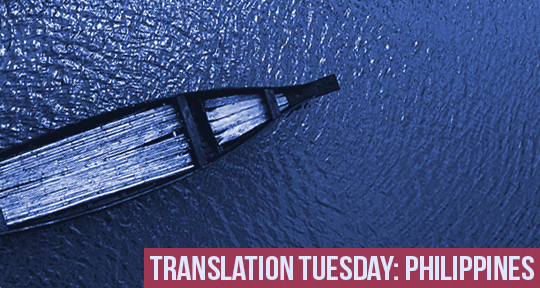Allan Popa’s poems are sublime examples of quiet that is every bit as piercing as a shout. Through visions of a body struggling to recognize the world, we are reminded through these subtle, yet vivid lines of what is kept, what is gone, and what is passed on. Wounds, light, reflection—all these things we see with our hands.
My Hands
Once again, I traced the path of a boat that healed the water. I whispered a courtesy and was permitted to pass the same old route. You haven’t gone far, said the stone that first wounded my knee. Yet I had believed it and let the hurrying damselflies through the window. On the roof, the leaves of the coconut are still sweeping their own shadow. The old neighbors are still trying to recognize themselves in the foggy mirror while my own face does not even recognize itself. Ay, if only my hands could be used for cover! How many times have I been let down? How many times have I tried cupping the water with my palms without my sense leaking out? I have nothing to reach you save my hands.
Firefly
How tight should the palms be clenched
for the firefly’s light
not to slip through
the slits between the fingers
How loose
should one cling on to a belief that
“you still hold something”
How does one pass on to others
that which is clenched How
does it change hands?
Translated from the Filipino by Bernard Capinpin
Allan Popa is the author of ten books of poetry including Hunos (Ateneo de Naga University Press, 2016), Damagan (UST Publishing House, 2018), and Narkotiko at Panganorin (Ateneo de Manila University Press, 2018). He was awarded the Philippines Free Press Literary Award in 1998–1999 and the Manila Critics Circle National Book Award for his books Morpo (Collective Axis, 2001) and Samsara (Amado V. Hernandez Resource Center, 2002). He won the Academy of American Poets Graduate Prize and the Norma Lowry Prize while getting his MFA in Writing at Washington University in Saint Louis. He received his Ph.D. in Literature from De La Salle University. He teaches Writing and Philippine Literature at the Ateneo de Manila University. His new book of poems Autopsiya ng Aking Kamatayan is forthcoming in 2019 from DLSU Publishing House.
Bernard Capinpin is a poet and translator. He is currently working on a translation of Ramon Guillermo’s Ang Makina ni Mang Turing. He resides in Quezon City.
*****
Read more translated literature on the Asymptote blog:

